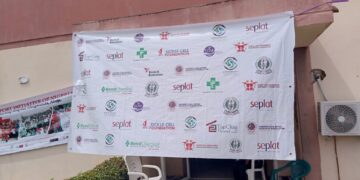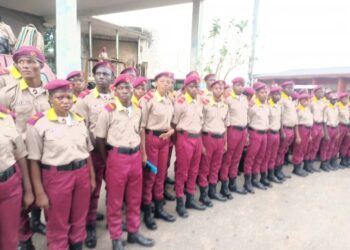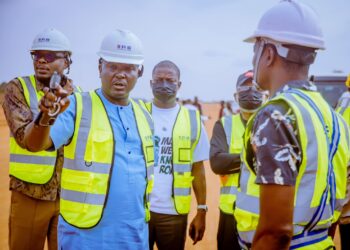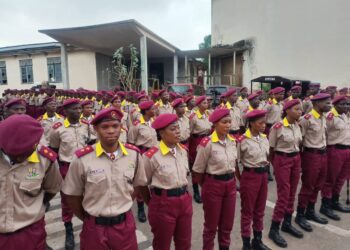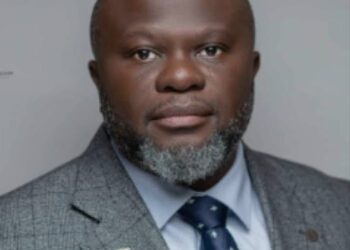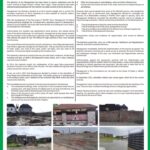It is quite disappointing that until the very last minute, even while the judgment was being read out, I kept assuring Kogites that justice would be done in our case. My confidence was rooted in the actions and sound rulings of the Tribunal throughout the petition. I vouched for the judges’ integrity.
I had to hide my face in shame after the judgment was delivered. Kogites are disappointed. We all feel we were misled into believing the judges would do justice to our case. I apologize for my own part in that. Our disappointment is not rooted in the fact that our candidate didn’t win at the Tribunal. No, no, no! Far from that! Our disappointment is rooted in the fact that there were two clear warnings before the judgment that the judgment was going to be sold to the highest bidder, and we dismissed them as unproven allegations. We decided to keep faith instead of making reports to the appropriate authorities.
The first warning was the leaked messages from the respondents’ camp, leaked by a good Samaritan who has the overall interest of Kogites in mind. The leaked chats showed that money was taken from the Kogi State government purse and converted into dollars to buy the judges over. The second warning, which came a few days before the judgment, was a voice note by a brave lady who had worked for the Chairman of the tribunal. She estimated the foreign currency used to bribe the judges to be approximately 6 billion naira.
The allegations started making sense after the judgment was delivered.
**IT IS VERY IMPORTANT THAT I STATE AT THIS POINT THAT WE ARE IN A VERY DELICATE PERIOD WHERE OUR ACTIONS SHOULD BE LOUDER THAN OUR WORDS. WE NEED LESS WRITE-UPS AND MORE ACTION. HOWEVER, PERMIT ME TO QUICKLY MAKE A SUMMARY AS TO WHY I BELIEVE THE JUDGES WERE COMPROMISED.**
The Tribunal held in its judgment that:
1. PW1 (Abdulmalik Njidda), an officer of the 1st Respondent (INEC), did not have his testimony captured in a Witness Statement on Oath and frontloaded with the petition, and he was not physically present in Kogi State on the day of the election (11th November, 2023).
2. The Tribunal ruling delivered on the 14th of February, 2024, was made per incuriam, meaning the Tribunal failed to pay attention to relevant statutory provisions and precedents while delivering their ruling.
3. Certified True Copies (CTC) of the voters register, BVAS screenshots, BVAS reports, and election results were tendered from the bar.
4. The Tribunal also held that issues of qualification are pre-election matters.
5. The Tribunal further held that an “Affidavit of Loss” does not qualify as a certificate as provided in the 1999 Constitution.
6. The Tribunal also held that the petitioners were unable to prove that it was the 2nd Respondent (Ododo) who falsified the affidavit.
7. The petitioners were supposed to bring an INEC staff to court to prove that the “forged affidavit” was actually received from the 2nd Respondent.
8. The petitioners also failed to prove that the 2nd Respondent authorized people to carry out the alleged over-voting.
9. The Witness Statements on Oath of the petitioners’ witnesses were identical.
10. PW24 (Ikani Okolo) is not the maker of the CTC of INEC documents which were attached to his inspection report.
We have extensively discussed most of these issues before, but I think it is necessary to quickly go through them (briefly).
**ISSUES 1 & 2 ARGUED TOGETHER: FRONTLOADING OF PW1’s WITNESS STATEMENT ON OATH AND THE ABSENCE OF PW1 ON THE DAY OF THE ELECTION IN KOGI STATE**
Even though there are numerous authorities in support of the petitioners’ claim that by reason of the order made by the Tribunal compelling the 1st Respondent to delegate their staff to display the BVAS machines in court, there was no need for them to file a Witness Statement on Oath for a staff of the 1st Respondent and frontload it together with their petition, as doing so is nearly impossible. I will only talk about the ruling of the Tribunal made on the 14th of February, 2024, in Motion No: *EPT/KG/GOV/03/M13/2024.*
The panel held in their judgment that their ruling in *EPT/KG/GOV/03/M13/2024* (this ruling ordered the 1st Respondent to delegate its staff to display the contents of the BVAS machines in open court. It was also stated in the ruling that the petitioners were not supposed to file a Witness Statement on Oath for a staff of the 1st Respondent before the court could admit his evidence) was made per incuriam. It is trite law that once a judge has delivered a ruling or judgment, he becomes functus officio in respect of such a decision. Even if a mistake was made, the proper way to correct such a mistake is to file a competent and valid appeal to a superior court to correct the error. The respondents in the petition actually exercised their right to appeal in Case No: *CA/ABJ/GOV/EP/KG/04/2024* and lost. By going back to “correct their mistake,” the Tribunal technically overruled the Court of Appeal, which is legally impossible.
Assuming but not conceding that the Tribunal has the power to overrule the Court of Appeal, their reason in the judgment for the mistake was that they relied on an old law. Even though that is their claim, the contents of the ruling are very important to the determination of the petition. The Tribunal held in that ruling that it will be easier for a camel to pass through the eye of a needle than for a petitioner to get a staff of the 1st Respondent to depose to a Witness Statement on Oath and frontload it with his petition. In other words, it is an impossibility. The issue of old and new law aside, the court now expects the petitioners to do the impossible? The reason elections go to court is so that justice can be done. How can a court of justice demand that a petitioner do the impossible? The apex courts have held in numerous cases that judges should focus more on the merits of election petitions rather than technicalities so that they can do substantial justice to any issue that comes before them. On this issue, it is my opinion that the Tribunal judges erred and that it is very embarrassing for an election petition tribunal to sit and overrule the Court of Appeal.
On the issue of the physical presence of PW1 during the election, it is trite that an expert need not be physically present at the locus criminis or where the cause of action arose. For example, a pathologist would be unable to give evidence in court as to the cause of death of a person if he wasn’t physically present when that person was killed, as per the Tribunal judges. It makes no sense.
**ISSUE 3: CTC OF VOTERS REGISTER, BVAS SCREENSHOTS TENDERED FROM THE BAR**
It is trite law that an election petition tribunal will not descend into the arena to help any party tie any piece of evidence to the party’s case. For this reason, it is desirable that any party who wants to tender a document in evidence should call a witness who will speak to the document and tie the document to the party’s case. To every law, there is an exception. The knowledge of the exceptions to the law is what differentiates a legal practitioner from a layman. Anybody can know the law. One of the exceptions to this rule is when the party tenders a Certified True Copy (CTC) of a public document. This is because such documents speak for themselves. See the case of *Belgore v. Ahmed*. The documents tendered from the bar by the petitioners are Certified True Copies (CTC) of the documents used during the November 11th, 2023, governorship election in Kogi State. These documents were properly issued by the 1st Respondent (INEC) itself. The only way such documents can be challenged is if INEC alleges that the documents did not come from them and they prove their allegation. That was not the case. To ensure that no loopholes were left, the petitioners went ahead to call PW24 (Ikani Okolo), who spoke to the documents and tied them to the petitioners’ case. It is surprising that the Tribunal still went ahead to expunge the CTCs of the documents used during the election.
*(TO BE CONTINUED)*
*Akpala Michael Junior*

